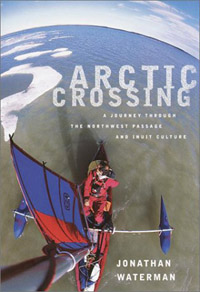

Arctic Crossing
A Journey Through the Northwest Passage and Inuit Culture
by Jonathan Waterman
Reviewed by Paul vanPeenen
In August 1999 I met Jonathan Waterman walking down one of the dusty streets of Gjoa Haven, Nunavut. We were both stranded in this remote Arctic hamlet. Waterman was waiting for better conditions to continue his expedition through the Northwest Passage, a journey he had begun two years earlier in Tuktoyaktok, while I had just finished an expedition and was waiting for a plane to take me home.
Although winter was rapidly approaching and he faced a dangerous 22 kilometre crossing of Rae Strait, Waterman continued by hitching a ride with two French sailors across the strait and carried on kayaking and hiking across the Boothia Isthmus for nearly another two weeks until he had fulfilled his desire to link the waters of the Atlantic and Pacific Oceans. Pack ice and the Arctic winter finally halted his progress and the risk of continuing to Pelly Bay just was not worth it. Besides, he had a good reason to go home: he and his fiancee, June, were planning to get married as soon as he returned.
In his new book Arctic Crossing, Waterman recounts his 3,541 kilometre trek through the Northwest Passage and his encounters with past and present Inuit culture. He paints a vivid portrait of the stark Arctic Landscape and his encounters with the wild animals that continue to thrive in one of the harshest locales on the planet. His frequent meetings with Inuit in their communities and on the land gave Waterman a new insight into that culture which most of us southerners know little or nothing about except for the sensational news reports showing young children sniffing gasoline.
He does not altogether paint a rosy picture of the troubled Inuit communities. He is witness to drug and alcohol abuse, poverty and unemployment and the struggle of a culture searching for its lost identity as it tries to fit its ancient values into a modern world that is not interested and lacks understanding. However, Waterman also describes the joy he sees in Taloyaok when a beluga whale is caught and the entire town comes out to the beach. He writes that "..the sadness is no longer evident on any of the faces surrounding me. These traditionally minded people are lifted back to another world as they stroke the whale’s soft skin and remember that it has given itself up as food..."
Waterman’s solo journey is a remarkable feat. Beginning in 1997, he paddled west from the mouth of the Mackenzie River to Prudhoe Bay, Alaska. The following spring and summer he traveled east from the Mackenzie River on skis, by dog sled and kayak finishing the journey in 1999 by kayaking from Umingmaktok to Lord Mayor Bay on the Gulf of Boothia.
The physical and psychological struggle of undertaking such a long trip alone in an often hostile environment demands fitness of both body and soul. In the popular genre of modern adventure stories Waterman’s story is unique because of the fusion of his own endeavor and that of the Inuit he encounters. It is not just another adventure story of an intrepid, goretex-clad explorer who sails off into the unknown and in the end overcomes overwhelming odds to redeem his prize. Instead, it is an anti-climactic story but rich in detail of the landscape and its inhabitants. Waterman’s prize is a greater understanding not just of a culture closely tied to this landscape but also of himself and how he relates to that culture and the landscape.
"Everything Inuit have taught me shows
that the world, even the remote Arctic, is a different place from
what I would like it to be." This is the crux as Waterman
realizes that in today’s fast paced society ancient Inuit
cultural values constantly collide with modern Western dogma and
that his own kind — the wilderness adventurer — is also
running out of room because there really are no new places to
discover. All the highest mountains have been climbed and all of
world’s oceans have been sailed. What is left to discover is
only within ourselves. With this, his eighth book, Waterman
succeeds to convey his personal discoveries while also shedding
some much needed light on the issues facing a marginal population
at the top of our world.
Paul vanPeenen is a writer, photographer and arctic traveler based in Maple Ridge, British Columbia.